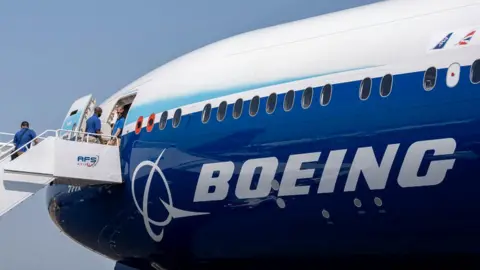Boeing: Plane maker plans to cut 2,000 office jobs this year
 Getty Images
Getty ImagesPlane maker Boeing plans to cut about 2,000 jobs in finance and human resources this year, as it focuses on engineering and manufacturing.
The move comes as the company puts more of its resources into "products, services and technology development".
It will outsource some of the roles to Tata Consulting Services, a unit of one of India's largest conglomerates.
Boeing has faced a number of issues in recent years, including the grounding of its 737 Max after two fatal crashes.
"We have and will continue to communicate transparently with our teams that we expect lower staffing within some corporate support functions," the company told the BBC.
"As always, we will support affected teammates and provide assistance and resources to support their transition," it added.
Around a third of the jobs will be outsourced to Tata Consulting Services, which is based in Bangalore (also known as Bengaluru).
However, Boeing also said that it will continue to increase its headcount "with a focus on engineering and manufacturing".
On top of the 15,000 people it hired in 2022, the company said it aims to recruit another 10,000 this year.
The aviation giant has been working to turn itself around after its 737 Max passenger jet was grounded worldwide after two fatal accidents.
On 29 October 2018, Lion Air Flight 610 crashed into the Java Sea 13 minutes after taking off from Jakarta's Soekarno-Hatta International Airport, killing all 189 passengers and crew.
Less than five months later, Ethiopian Airlines Flight 302, another Boeing 737 Max on its way to Kenya, crashed six minutes after leaving Ethiopia's capital Addis Ababa. All 157 people on board were killed.
It later emerged that both accidents were triggered by design flaws, in particular the use of flight control software known as the "Maneuvering Characteristics Augmentation System" (MCAS).
The system was designed to assist pilots familiar with previous generations of the 737, and prevent them from needing costly extra training in order to fly the new model.
But sensor failures caused it to malfunction, and in both cases it forced the aircraft into a catastrophic dive the pilots were unable to prevent.
After modifications to the aircraft and pilot training, the 737 Max aircraft has now been cleared to fly again in most countries around the world.

